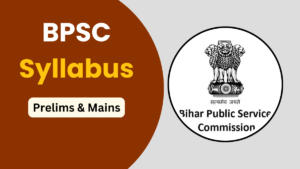Table of Contents
The Geo Scientist syllabus for the UPSC exam is available on the official UPSC website. Candidates must thoroughly review the syllabus before applying, as it covers both the preliminary and main written exams. The preliminary exam is computer-based and features objective-type questions. Candidates who pass the preliminary exam will advance to the main exam.
UPSC Geo-Scientist Syllabus Highlights
The UPSC Geo-Scientist exam, organized by the Union Public Service Commission (UPSC), is a renowned and demanding assessment aimed at selecting candidates for diverse geological and geoscientific services across the nation. Administered on behalf of the Government of India, the UPSC Geo-Scientist and Geologist Exam, commonly known as UPSC GSI, is officially titled the Union Public Service Commission Geological Survey of India Examination. Check detailed notifications of UPSC Geo-Scientist Recruitment Notification
| UPSC Geo-Scientist Exam 2025 Highlights | |
| Exam Name | Combined Geo-scientist and Geologist Exam |
| Exam Conducted by |
Union Public Service Commission (UPSC)
|
| Category |
Syllabus and Exam Pattern
|
| Selection Criteria |
Written Exam and Interview
|
| Job Location | PAN India |
| Official Website | http://upsc.gov.in |
UPSC Combined Geo-scientist Exam
For those who wish to work as geologists, geophysicists, or chemists, the UPSC Combined Geo-Scientist examination offers a chance. You must thoroughly comprehend all of the important exam formats in order to perform well on this challenging exam.
UPSC Geo-Scientist Prelims Syllabus 2025
Before you start getting ready for the UPSC Combined Geo-Scientist exam, make sure to check the syllabus. The syllabus will guide your preparation. The first part of the preliminary test, the general studies paper, has the same topics for everyone. However, for the second part of the preliminary test and all the main exam papers, the UPSC Combined Geoscientist Syllabus is different for each stream of the exam.
| UPSC Geo-Scientist Syllabus for Prelims | |
| Paper 1 – General Studies |
|
| Paper 2 – Hydrology/Geology Candidates |
|
| Paper 2 – Chemistry Candidates |
|
| Paper 2 – Geophysics Candidates |
|
UPSC Geo-Scientist Mains Syllabus 2025
Here is the detailed syllabus for the UPSC Geo-Scientist Mains examination across all categories. Refer to the table below for the complete syllabus:
| UPSC Geo-Scientist Syllabus for Mains | |
| Post-Geologist/ Scientist ‘B’ (Hydrogeology) – Descriptive Paper | |
| Paper 1 – Geology |
|
| Paper 2 – Geology |
|
| Paper 3 – Geology |
|
| Hydrogeology |
|
| Post – Geophysicist/ Scientist ‘B’ (Geophysics) | |
| Paper 1 – Geophysics (Part – A) |
|
| Part – B |
|
| Paper 2 – Geophysics (Part – A) |
|
| Part – B |
|
| Paper 3 – Geophysics (Part – A) |
|
| Part – B |
|
| Posts – Chemist/ Scientist ‘B’ (Chemical) | |
| Paper 1 – Chemistry (Inorganic Chemistry) |
|
| Paper 2 – Chemistry (Physical Chemistry) |
|
| Paper 3 – Chemistry (Analytical and Organic) Part A |
|
| Part B – Organic Chemistry |
|
UPSC Geo-Scientist Exam Pattern
Understanding the exam pattern is crucial for effective preparation. Review the details outlined in the UPSC Geo-Scientist Exam Pattern to prepare effectively for the exam and to be aware of the scoring system. The table below provides a breakdown of the UPSC Geo-Scientist Exam Pattern for each stage of the selection process (Prelims, Mains, and Interview).
UPSC Geo-Scientist Prelims Exam Pattern
The preliminary exam has two papers, and for each question, you’ll have multiple-choice options to choose from. The exam is conducted in English, and you must select the correct answer from the four options provided. If you answer a question incorrectly, one-third of the marks for that question will be deducted as a penalty. However, if you leave a question blank or don’t answer it, there won’t be any penalty. You’ll have a total of two hours to complete each exam.
|
UPSC Geo-Scientist Exam Pattern for Prelims
|
||
|
Stream-I: Geologist & Scientist B (Hydrogeology)
|
||
| Subject | Duration(hours) | Marks |
| Paper-1 General Studies | 2 hours | 100 marks |
| Paper-2 Geology/Hydrogeology | 2 hours | 300 marks |
| Total | 400 marks | |
|
Stream-II: Geophysicist & Scientist ‘B’(Geophysics)
|
||
| Subject | Duration(hours) | Marks |
| Paper-1 General Studies | 2 hours | 100 marks |
| Paper-2 Geophysics | 2 hours | 300 marks |
| Total | 400 marks | |
|
Stream-III: Chemist and Scientist ‘B’(Chemical)
|
||
| Subject | Duration(hours) | Marks |
| Paper-1 General Studies | 2 hours | 100 marks |
| Paper-2 Chemistry | 2 hours | 300 marks |
| Total | 400 marks | |
UPSC Geo-Scientist Mains Exam Pattern
The exam has three papers, each related to a specific subject, and each is worth 200 marks. You’ll have three hours for each paper to answer the questions. All the questions and answers will be in English.
|
UPSC Geo-Scientist Exam Pattern for Mains
|
||
| Stream-I: Geologist | ||
| Subject | Duration | Maximum Marks |
| Paper-I: Geology | 3 Hours | 200 Marks |
| Paper-II: Geology | 3 Hours | 200 Marks |
| Paper-III: Geology | 3 Hours | 200 Marks |
| Total | 600 Marks | |
|
Stream-II: Geophysicist and Scientist ‘B’ (Geophysics)
|
||
| Subject | Duration | Maximum Marks |
| Paper-I: Geophysics | 3 Hours | 200 Marks |
| Paper-II: Geophysics | 3 Hours | 200 Marks |
| Paper-III: Geophysics | 3 Hours | 200 Marks |
| Total | 600 Marks | |
|
Stream-III: Chemist & Scientist ‘B’ (Chemical)
|
||
| Subject | Duration | Maximum Marks |
| Paper-I: Chemistry | 3 Hours | 200 Marks |
| Paper-II: Chemistry | 3 Hours | 200 Marks |
| Paper-III: Chemistry | 3 Hours | 200 Marks |
| Total | 600 Marks | |
| Stream-IV: Scientist ‘B’(Hydrogeology) | ||
| Subject | Duration | Maximum Marks |
| Paper-I: Geology | 3 Hours | 200 Marks |
| Paper-II: Geology | 3 Hours | 200 Marks |
| Paper-III: Hydrogeology | 3 Hours | 200 Marks |
| Total | 600 Marks | |
UPSC Geo-Scientist Interview
The UPSC Geo-Scientist interview, often referred to as the Personality Test, is the final and crucial phase of the selection process. Here, candidates get the opportunity to showcase not only their knowledge but also their communication skills, demeanor, and overall personality. The UPSC Combined Geoscientist interview doesn’t follow a specific syllabus, as per the Commission. Instead, it includes a personality test. To get ready for the interview, candidates should review the core concepts of their subjects and also work on improving their soft skills.
| ALSO READ | |
| UPSC MATHS OPTIONAL | PHYSICS OPTIONAL |
| UPSC PHILOSOPHY OPTIONAL | UPSC SOCIOLOGY OPTIONAL |
| UPSC PSYCHOLOGY OPTIONAL | UPSC Anthropology OPTIONAL |



 APSC Syllabus 2025, Download Prelims And...
APSC Syllabus 2025, Download Prelims And...
 Punjab PCS Syllabus 2025, New Prelims an...
Punjab PCS Syllabus 2025, New Prelims an...
 BPSC Syllabus 2025 and Exam Pattern For ...
BPSC Syllabus 2025 and Exam Pattern For ...
